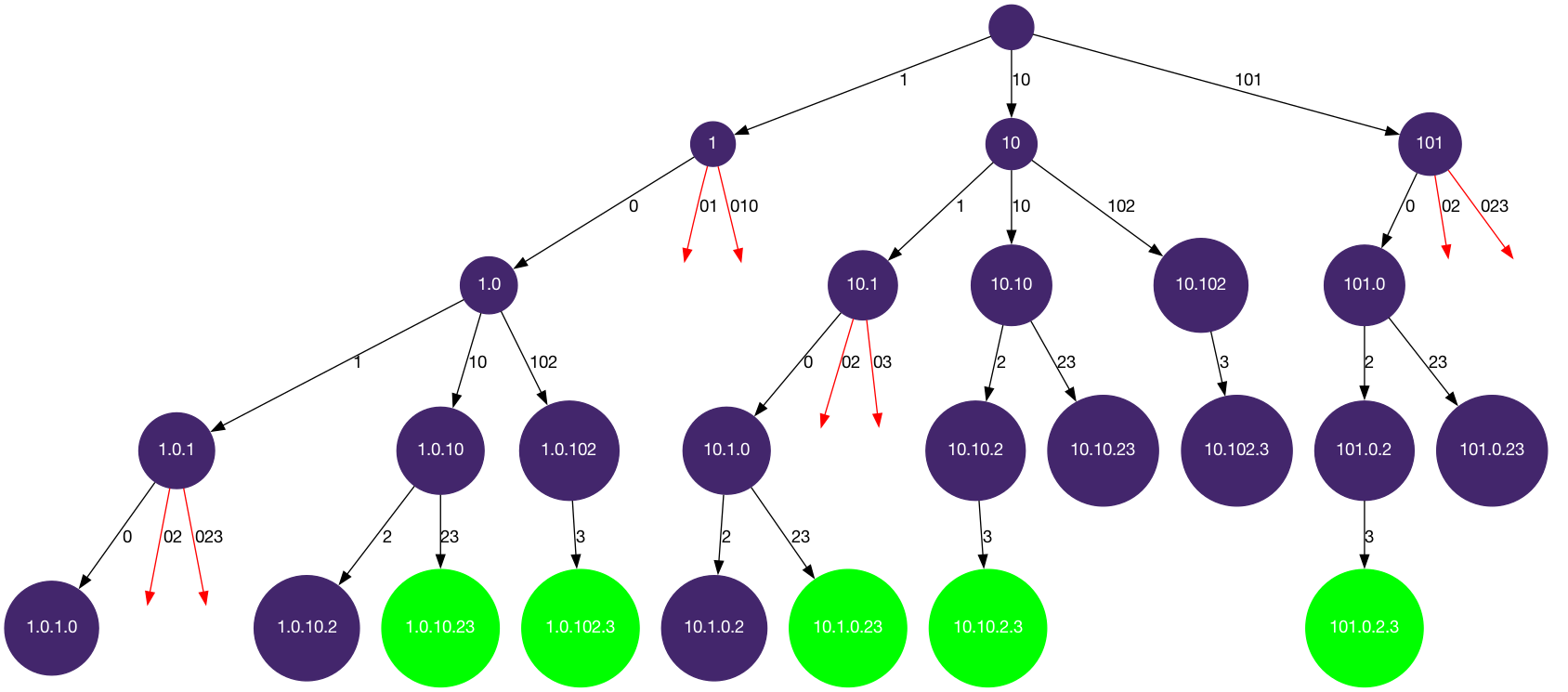Restore IP Addresses
A valid IP address consists of exactly four integers separated by single dots. Each integer is between 0 and 255 (inclusive) and cannot have leading zeros.
For example, "0.1.2.201" and "192.168.1.1" are valid IP addresses, but "0.011.255.245", "192.168.1.312" and "192.168@1.1" are invalid IP addresses.
Given a string s containing only digits, return all possible valid IP addresses that can be formed by inserting dots into s. You are not allowed to reorder or remove any digits in s. You may return the valid IP addresses in any order.
Example 1:
Input: s = "25525511135"
Output: ["255.255.11.135","255.255.111.35"]
Example 2:
Input: s = "0000"
Output: ["0.0.0.0"]
Example 3:
Input: s = "101023"
Output: ["1.0.10.23","1.0.102.3","10.1.0.23","10.10.2.3","101.0.2.3"]
Constraints:
1 <= s.length <= 20sconsists of digits only.
Solution
We want to apply our template backtracking1 to this problem. To fill in the logic:
is_leaf:start_index == len(s) andlen(path) == 4`, when all of the digits are used and there are exactly 4 segments.get_edges: the edges are the potential segments (of size 1-3) that starts atstart_index.is_valid: is the edge (integer) between 0 to 255? and does it not have a leading zero?
Implementation
def restoreIpAddresses(self, s: str) -> List[str]:
def to_ip_address(path):
address = path[0]
for i in range(1, 4): address += "." + path[i]
return address
def get_edges(start_index):
segments = []
for i in range(start_index, start_index + 3):
if i < len(s) : # if not out of bound
segments.append(s[start_index:i+1]) # up to and including s[i]
return segments
def is_valid(num):
if num == "0": return True
elif num[0] == "0": return False # leading zero
elif int(num) > 255: return False # out of range
else: return True
def dfs(start_index, path):
if len(path) > 4: return
if start_index == len(s): # if all digits are used
if len(path) == 4: # and there are exactly four segments
ans.append(to_ip_address(path)) # add address to the result
return
for edge in get_edges(start_index):
if is_valid(edge):
path.append(edge)
dfs(start_index + len(edge), path)
path.pop()
ans = []
print(s[0:len(s)+1])
dfs(0, [])
return ans

Ready to land your dream job?
Unlock your dream job with a 5-minute evaluator for a personalized learning plan!
Start EvaluatorHow many ways can you arrange the three letters A, B and C?
Recommended Readings
Coding Interview Patterns Your Personal Dijkstra's Algorithm to Landing Your Dream Job The goal of AlgoMonster is to help you get a job in the shortest amount of time possible in a data driven way We compiled datasets of tech interview problems and broke them down by patterns This way
Recursion If you prefer videos here's a video that explains recursion in a fun and easy way Recursion is one of the most important concepts in computer science Simply speaking recursion is the process of a function calling itself Using a real life analogy imagine a scenario where you invite your friends to lunch https assets algo monster recursion jpg You first call Ben and ask him
Runtime Overview When learning about algorithms and data structures you'll frequently encounter the term time complexity This concept is fundamental in computer science and offers insights into how long an algorithm takes to complete given a certain input size What is Time Complexity Time complexity represents the amount of time
Want a Structured Path to Master System Design Too? Don’t Miss This!
